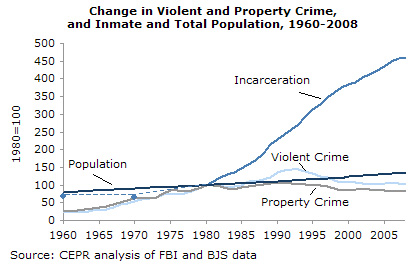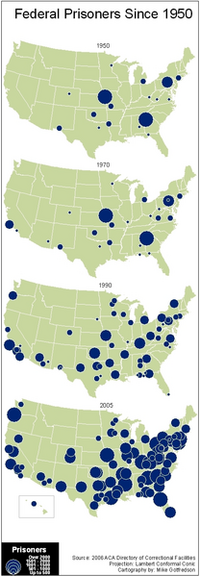Georgia Governor Nathan Deal has said that violent offenders will remain behind bars, but the state needs to rethink the costs of locking up others, like nonviolent drug offenders.Last May we noted that Georgia spends a billion dollars a year to keep the fourth-largest number of prisoners of any state. Now that the state is cutting every other budget, including huge cuts in education, we just can’t afford to lock so many people up.
 The number of people locked up
has grown way faster than violent crime since 1980.
The U.S.,
with 5% of the world’s populatioon now has 25% of
the world’s prison population:
more than any other country total and per capita:
more than China, more than Russia, more than Cuba.
As Sen. James Webb remarked in 2009:
The number of people locked up
has grown way faster than violent crime since 1980.
The U.S.,
with 5% of the world’s populatioon now has 25% of
the world’s prison population:
more than any other country total and per capita:
more than China, more than Russia, more than Cuba.
As Sen. James Webb remarked in 2009:
“Either we’re the most evil people on earth, or we’re doing something wrong.”Most of that prisoner growth since 1980 has been in the states,
 and most of that has been in the south.
and most of that has been in the south.
Texas has already hit the financial prison wall, and now leads in treatment “to cut costs and crime at the same time”, according to Cindy Horswell in the Houston Chronicle, 15 Dec 2009:
Now, Texas has a new swagger that comes from a recently released U.S. Justice Department report showing the growth of the state’s prison population is slowing to the extent that three new prisons slated for construction have been scrapped. At the same time, the state is becoming the unlikely new role model for a prison reform movement spreading across the country.What if instead of building a private prison we invest in getting people jobs when they get out of jail? We could get out in front of this prison reduction movement instead of continuing down a known dead end. Producing a local industry of preventing incarceration and reducing recidivism could provide local jobs that could possibly even generate training revenue as other states realize they can’t keep spending their children’s education money on locking them up instead.State Rep. Jerry Madden, R-Plano, and state Sen. John Whitmire, D-Houston, worked across partisan lines to implement the “reinvestment movement” in 2007, which they say is just starting to show results. The program invests state funds in drug, alcohol and mental health programs to treat offenders rather than just prisons to house them.
“Texas is showing the rest of the country that if you look at research you can find ways to cut costs and crime at the same time,” said Adam Gelb, director of the Pew Center’s public safety performance project, a nonprofit think tank. “Just this week the work that Texas has done was featured prominently at the national conference on state legislatures in San Diego. States are learning that they just can’t build their way out of crime.”
-jsq
Short Link: